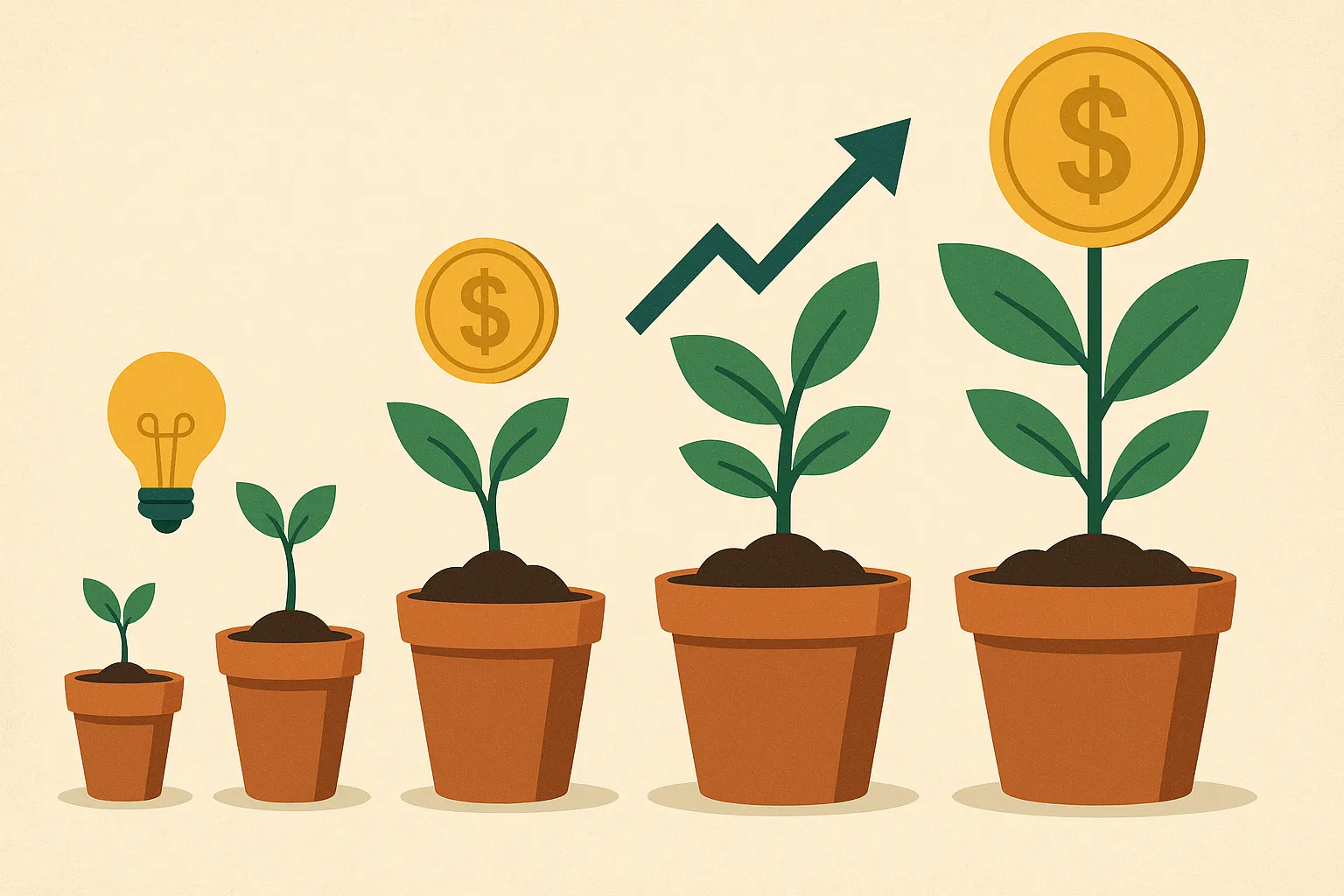When you think of venture capital, one name always pops up—Sequoia Capital. This firm has backed giants like Apple, Google, WhatsApp, Airbnb, and Stripe, turning bold ideas into world-changing companies. Curious how they pulled it off? You’re not alone.
In fact, according to CB Insights, over 65% of startups fail due to poor product-market fit, yet Sequoia consistently spots winners early.
In this guide, you’ll see how Sequoia structured its funds, supported founders beyond money, and built the most iconic portfolio in tech history. Ready? Let’s dive in.
The Early Stage Vision: Spotting Ideas Before They Were Companies

How Sequoia helped founders turn an idea into a company
Sequoia Capital is known for seeing potential before anyone else. They often back founders at the seed stage or early stage, when the startup is just an idea. This means the company might not have many customers or even a finished product yet.
Here’s how they add value:
- They give money to help founders build their first product.
- They provide access to partners and a global team who guide product and market strategy.
- They connect startups with first customers, helping prove if the idea works in the real world.
“Sequoia doesn’t just invest in businesses. They invest in individuals who want to change the world,” said Don Valentine, Sequoia’s founder. This early push explains why companies like Apple and Google grew from small beginnings into global giants.
The philosophy of “daring build legendary companies”
Sequoia’s approach is clear: back bold ideas and help them scale. They believe in daring build legendary companies rather than chasing safe bets.
Key parts of this philosophy:
- Focus on the founder’s vision, not just short-term returns.
- Support growth across different stages of the fund.
- Encourage smart spending and strong retention of early employees.
- Work with startups in big sectors like healthcare, security, and consumer platforms.
According to Crunchbase, more than 20% of Sequoia’s portfolio has gone public or been acquired, proving this strategy works. This long-term mindset is why Sequoia Capital continues to invest in ideas that look risky today but become valuable tomorrow.
How Sequoia Structured its Funds Across Stages

Sequoia Capital did not stop at early bets. They built funds for every stage of a company’s journey—seed, early, and growth funds. This structure gives founders long-term support without switching investors.
Here’s what makes their growth model powerful:
- Early Stage: Focus on building the product and finding first customers.
- Growth Stage: Larger funds help with scaling, hiring more employees, and global expansion.
- Public Companies: Some of their best-known investments—like Apple, Google, and Airbnb—moved from private to public companies with Sequoia’s backing.
“Sequoia doesn’t just give money. They help you raise, scale, and manage smarter,” reported TechCrunch in 2023. This mix of funds means they benefit from success at every stage—from the first round of capital to the IPO.
Evolution of Growth Funds and Global Expansion

Sequoia Capital started in Menlo Park, but today, its reach is global. They run large funds in the U.S., India, and China, giving them access to fast-growing sectors like healthcare, security, and consumer tech.
Why does this matter?
- Startups in these regions get capital, guidance, and access to global customers.
- The firm adapts its process to local industries, making it more effective.
- This global team connects founders to the right partners and opportunities.
According to PitchBook, Sequoia has managed over $85 billion in assets through multiple funds worldwide. That scale makes them one of the most valuable venture firms in history.
Sequoia’s Investments Across Private and Public Companies

Notable private companies in Sequoia’s portfolio
Sequoia Capital is famous for spotting winners before the rest of the world notices. Their portfolio includes powerful private companies across different sectors like fintech, healthcare, and consumer platforms.
Some of the well-known names include:
- DoorDash – changed how customers order food.
- Stripe – a fintech leader helping businesses handle payments.
- Byju’s in India – one of the fastest-growing edtech startups.
- Instacart – reshaped grocery shopping for millions of individuals.
These companies are still private, but they attract billions in funds and prepare for future IPOs. According to Crunchbase, Sequoia-backed private firms have raised over $40 billion across hundreds of rounds, showing how much the firm invests in early and growth stages.
Iconic public companies (Apple, Google, WhatsApp, Airbnb, Stripe)
Sequoia Capital has also backed legendary public companies that changed how the world works.
- Apple – invested in the early stage, supporting its journey from garage startup to trillion-dollar company.
- Google – helped founders scale search into one of the most valuable businesses in history.
- WhatsApp – backed from the start, later sold to Facebook for $19 billion, one of the biggest tech deals ever.
- Airbnb – supported through tough times, including during the pandemic, before its successful IPO in December 2020.
- Stripe – while still private, its influence makes it as impactful as many public companies.
“Sequoia doesn’t just give money. They give you a playbook to build a global company,” said Brian Chesky, founder of Airbnb. With partners guiding across every stage, Sequoia proves why it remains one of the most trusted investors in both private and public markets.
Beyond Money: How Sequoia Partners Add Value

When people hear Sequoia Capital, they think of money and investments. But the truth is, Sequoia offers much more than cash. Their partners work with founders, teams, and companies at every stage of growth. Here’s how they add value beyond money.
- Hands-On Product Strategy: Sequoia helps founders shape their product strategy. They sit with teams, test features, and give feedback. This makes sure the company builds what real customers need, not just what looks cool on paper.
- Customer and Market Insights: Getting customers is hard. Sequoia uses data and market research to guide startups. They also connect companies with first customers to test demand. A Sequoia report showed that early market testing improved retention by 30%.
- Hiring and Retention Guidance: Good products fail without the right employees. Sequoia advises on hiring and keeping top talent. They share playbooks on retention, pay, and culture. This helps companies build strong teams early.
- Operational Playbooks: Every startup faces challenges in scaling. Sequoia brings proven processes from earlier projects like Apple and Google. They teach smart spending, financial discipline, and long-term value creation.
- Global Network and Deals: Sequoia Capital has offices from Menlo Park to India and China. Their global network connects founders with new partners, investors, and deals. This helps startups enter new sectors and grow faster.
- Emotional Support for Founders: Building a company is stressful. Sequoia’s partners often act as mentors. They help individuals handle pressure, make tough calls, and stay focused. Many founders say this support is as important as the funds.
- Long-Term Commitment: Unlike some firms that exit quickly, Sequoia Capital stays with companies from the seed stage to IPO. They back bold ideas for decades. This long-term trust makes them one of the most valuable venture firms in history.
Industry Sectors that Shaped the Portfolio

- Technology & Platforms: Sequoia supported tech startups like Apple and Google when they were small. These companies grew into global platforms that billions of customers use every day. Technology remains Sequoia’s strongest area.
- Healthcare & Biotech: In healthcare, Sequoia invests in digital tools and biotech research. These companies create treatments, apps, and services that improve patient care. By funding this sector, Sequoia helps bring innovation to hospitals and clinics.
- Security & Infrastructure: With the rise of cyber threats, security is critical. Sequoia has backed firms building tools to protect data, networks, and cloud systems. These investments help both businesses and individuals stay safe.
- Consumer & Marketplaces: Sequoia supported companies like Airbnb, DoorDash, and WhatsApp. These startups changed how people travel, order food, and connect. By focusing on customers’ needs, Sequoia built a strong consumer portfolio.
- Fintech & Financial Services: Sequoia Capital is also a leader in fintech. They backed Stripe and Klarna, companies that make payments simple for businesses and individuals. These investments show Sequoia’s eye for growth in the financial world.
Sequoia’s Unique Programs and Global Reach

- Founder Support Programs: Sequoia runs fellowships like the Open Source Fellowship. These help individuals and startups test new ideas and build early projects. Programs like these give founders the tools, mentors, and funds to get started.
- The Global Playbook: From Menlo Park to Asia, Sequoia uses a proven process. They guide companies through every stage—seed, early, and growth. Their partners share the same playbook worldwide, so each company gets consistent support.
- Expansion into India and China: Sequoia made bold moves into India and China. These regions are filled with fast-growing startups in healthcare, fintech, and consumer platforms. By raising regional funds, Sequoia helps local companies expand faster.
- Nonprofit and Community Work: Sequoia also supports nonprofits. Through partnerships with groups like the Ford Foundation, they fund projects that bring benefits to communities. This shows that Sequoia cares about more than just business returns.
- Network of Global Partners: The team at Sequoia Capital connects founders with global investors, advisors, and customers. This network opens doors to new markets, new deals, and long-term growth.
- Staying Relevant Across Decades: Sequoia has stayed strong for over 50 years. They have adapted to new sectors, global challenges, and big shifts in the industry. Today, Sequoia remains one of the most valuable venture firms worldwide.
The Sequoia Process: How Great Investments Are Made

- Relentless Focus on Founders: Sequoia looks closely at the founder. Do they have vision? Can they build a strong team? The partners believe that the right individuals can turn even a small idea into a global company.
- Early Stage Discipline: Sequoia Capital often invests at the seed stage or early stage. This means they back startups before they are proven. By entering early, they gain higher potential returns, but they also guide the business from the ground up.
- Deep Dives into Markets & Sectors: Before making a move, Sequoia studies the market, sectors, and customers. They ask: Is there real demand? Is the business solving a large problem? This step reduces risk and makes investments smarter.
- Rigorous Deal Process: Every deal goes through strict checks. The partners review the round details, the risks, and the possible growth. Decisions are debated to make sure the funds go to the best companies.
- Hands-On Support After Investment: Once a startup gets funding, Sequoia doesn’t walk away. They help with product strategy, retention of early employees, and winning first customers. This support makes scaling easier.
- Learning from Reported Successes and Failures: Sequoia studies past projects. They look at big wins like Apple and Google, but also at mistakes. By reviewing reported outcomes, they build better frameworks for future investments.
- Global Consistency with Local Adaptation: From Menlo Park to India and China, Sequoia follows the same core values. But they adapt to local industries, challenges, and customers. This balance keeps them relevant worldwide.
Conclusion
Sequoia Capital shows how smart investments shape the future. From the early stage to IPO, their partners support founders, teams, and companies with more than just money. They study each business, guide product strategy, and help win customers.
Today, Sequoia’s portfolio covers private companies, public companies, and global startups in sectors like healthcare, security, and fintech. Their funds keep growing across India, China, and beyond.
If you look at the data, the results are clear—Sequoia-backed firms represent over $3.5 trillion in market value (CB Insights). That is not just success; it is proof of long-term vision.
So what does this mean for you? If you want to learn how to build a company, study how Sequoia works. Their process—focusing on founders, testing every idea, and building value—offers lessons for any individual or business.





.png)

.png)
